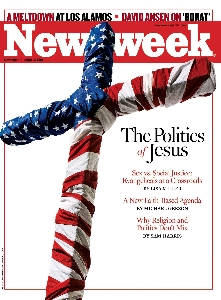
Sixty-Two Percent of Evangelicals Say Religion Plays Too Small a Role in American Political and Cultural Life, Compared to 37 Percent of the American Public
For Evangelicals
Contact: Natalia Labenskyj, Newsweek, 212-445-4078
NEW YORK, Nov. 6 /Standard Newswire/ -- In the days before the midterm elections, 62 percent of evangelicals say that religion plays too small a role in American political and cultural life today, compared to 37 percent of the American public, according to the November 2-3, 2006, Newsweek Poll, part of the November 13 cover package "The Politics of Jesus" (on newsstands Monday, November 6). Twenty-nine percent of the American public is equally divided over whether the role religion plays is too big or about right; whereas 21 percent of evangelicals say that the role religion plays is about right; and 14 percent say it plays too big a role.
Photo: In the November 13 issue (on newsstands Monday, November 6) "The Politics of Jesus" Newsweek explores the emerging tensions within the evangelical movement between those who emphasize sexual morality and those who are looking more to poverty and global health. Also, guest essays by Michael Gerson and Sam Harris. Plus: A security breach at
Twenty-six percent of evangelicals say that their top priority this election day will be
In the current issue, Miller explores the emerging tensions within the evangelical movement between those who emphasize sexual morality and those who are looking more to poverty and global health. A new generation of evangelical believers is pressing beyond the religious right of Jerry Falwell and Pat Robertson, trying to broaden the movement's focus from the familiar wars about sex to include issues of social and economic justice. The result is a new hour of decision for evangelicals: How much do they have to show for the decades of activism? And if they are to turn from what Roger Williams called "the
Many evangelicals are now part of the establishment they once ran against. George W. Bush credits Billy Graham with saving him from a life of drift and drink. To keep lines of communication open after the 2000 election, the White House began making weekly calls to the evangelical community -- an opportunity for Christians to air grievances and make demands. Chuck Colson, who founded the faith-based group Prison Fellowship after being incarcerated for his involvement in the Watergate scandal, says the evangelical movement has "matured." Christians have great access to the president, who is interested in a broad range of issues beyond the hot buttons of abortion and same-sex marriage, he says. "I was the one who brought the sexual-trafficking issue to Bush personally," says Colson, clearly relishing his high-level access.
To a large degree, the evolution is generational; evangelicals who voted Republican over the past 30 years had parents who were Democrats. And as intellectuals continue to debate the semantics, a diverse group continues to gather under the tent. "Evangelical" is no longer equivalent to "fundamentalist." Today an evangelical church can be white, black, Asian or Hispanic, Pentecostal, charismatic, fundamentalist, nondenominational -- or even Catholic. According to the new Newsweek Poll, evangelicals agree with the general public on issues ranging from stem cells to health care.
Also as part of the cover package, Contributor Sam Harris, an atheist who is the author of "Letter to a Christian Nation" and "The End of Faith," offers his perspective on mixing politics and religion. (Read entire cover package at http://www.Newsweek.com.)
Cover: http://www.msnbc.msn.com/id/15566654/site/newsweek/
Sam Harris: A Dissent: The Case Against Faith: http://www.msnbc.msn.com/id/15566391/site/newsweek/




 Sign Up to Receive Press Releases:
Sign Up to Receive Press Releases: